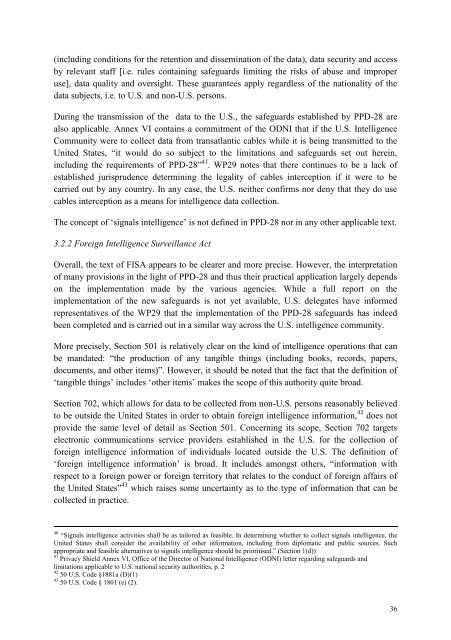ARTICLE 29 DATA PROTECTION WORKING PARTY
1SANK0H
1SANK0H
You also want an ePaper? Increase the reach of your titles
YUMPU automatically turns print PDFs into web optimized ePapers that Google loves.
(including conditions for the retention and dissemination of the data), data security and access<br />
by relevant staff [i.e. rules containing safeguards limiting the risks of abuse and improper<br />
use], data quality and oversight. These guarantees apply regardless of the nationality of the<br />
data subjects, i.e. to U.S. and non-U.S. persons.<br />
During the transmission of the data to the U.S., the safeguards established by PPD-28 are<br />
also applicable. Annex VI contains a commitment of the ODNI that if the U.S. Intelligence<br />
Community were to collect data from transatlantic cables while it is being transmitted to the<br />
United States, “it would do so subject to the limitations and safeguards set out herein,<br />
including the requirements of PPD-28” 41 . WP<strong>29</strong> notes that there continues to be a lack of<br />
established jurisprudence determining the legality of cables interception if it were to be<br />
carried out by any country. In any case, the U.S. neither confirms nor deny that they do use<br />
cables interception as a means for intelligence data collection.<br />
The concept of ‘signals intelligence’ is not defined in PPD-28 nor in any other applicable text.<br />
3.2.2 Foreign Intelligence Surveillance Act<br />
Overall, the text of FISA appears to be clearer and more precise. However, the interpretation<br />
of many provisions in the light of PPD-28 and thus their practical application largely depends<br />
on the implementation made by the various agencies. While a full report on the<br />
implementation of the new safeguards is not yet available, U.S. delegates have informed<br />
representatives of the WP<strong>29</strong> that the implementation of the PPD-28 safeguards has indeed<br />
been completed and is carried out in a similar way across the U.S. intelligence community.<br />
More precisely, Section 501 is relatively clear on the kind of intelligence operations that can<br />
be mandated: “the production of any tangible things (including books, records, papers,<br />
documents, and other items)”. However, it should be noted that the fact that the definition of<br />
‘tangible things’ includes ‘other items’ makes the scope of this authority quite broad.<br />
Section 702, which allows for data to be collected from non-U.S. persons reasonably believed<br />
to be outside the United States in order to obtain foreign intelligence information, 42 does not<br />
provide the same level of detail as Section 501. Concerning its scope, Section 702 targets<br />
electronic communications service providers established in the U.S. for the collection of<br />
foreign intelligence information of individuals located outside the U.S. The definition of<br />
‘foreign intelligence information’ is broad. It includes amongst others, “information with<br />
respect to a foreign power or foreign territory that relates to the conduct of foreign affairs of<br />
the United States” 43 which raises some uncertainty as to the type of information that can be<br />
collected in practice.<br />
40 “Signals intelligence activities shall be as tailored as feasible. In determining whether to collect signals intelligence, the<br />
United States shall consider the availability of other information, including from diplomatic and public sources. Such<br />
appropriate and feasible alternatives to signals intelligence should be prioritised.” (Section 1(d))<br />
41 Privacy Shield Annex VI, Office of the Director of National Intelligence (ODNI) letter regarding safeguards and<br />
limitations applicable to U.S. national security authorities, p. 2<br />
42 50 U.S. Code §1881a (D)(1)<br />
43 50 U.S. Code § 1801 (e) (2).<br />
36


